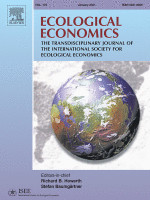Analyzing constraints in the water-energy-food nexus: The case of eucalyptus plantation in Ethiopia

20.10.2020
Land use, Water-energy-food nexus, Agent-based modelling, Externality, Sustainable development
Ecological Economics, Volume 180, February 2021, 106875
Analyzing constraints in the water-energy-food nexus: The case of eucalyptus plantation in Ethiopia
The study explores complex non-linear decisions in land use allocation, focusing on the competition between cash and food crops. We develop an agent-based model to investigate whether the decision to opt for eucalyptus plantation is a rational choice in the perspective of different farmer types. We analyse the negative externalities (i.e. allelopathic effects) caused by the presence of eucalyptus on the productivity of neighbouring plots and the possible spill-over effects. The findings demonstrate that cultivation of eucalyptus as a cash crop may improve the rural populations’ well-being only if there are no physical and economical constraints on access to food and services. The model shows that the allelopathic characteristics of eucalyptus strongly affect the soil fertility, inhibiting the possibility to switch to food crops in the future. In addition, the results of policy scenario simulations indicate that government environmental policies can play a key-role in improving awareness of the ecological effects of eucalyptus plantation on soil fertility in fragile socio-economic contexts characterized by high ecological vulnerability.
The study explores complex non-linear decisions in land use allocation, focusing on the competition between cash and food crops. We develop an agent-based model to investigate whether the decision to opt for eucalyptus plantation is a rational choice in the perspective of different farmer types. We analyse the negative externalities (i.e. allelopathic effects) caused by the presence of eucalyptus on the productivity of neighbouring plots and the possible spill-over effects. The findings demonstrate that cultivation of eucalyptus as a cash crop may improve the rural populations’ well-being only if there are no physical and economical constraints on access to food and services. The model shows that the allelopathic characteristics of eucalyptus strongly affect the soil fertility, inhibiting the possibility to switch to food crops in the future. In addition, the results of policy scenario simulations indicate that government environmental policies can play a key-role in improving awareness of the ecological effects of eucalyptus plantation on soil fertility in fragile socio-economic contexts characterized by high ecological vulnerability.
